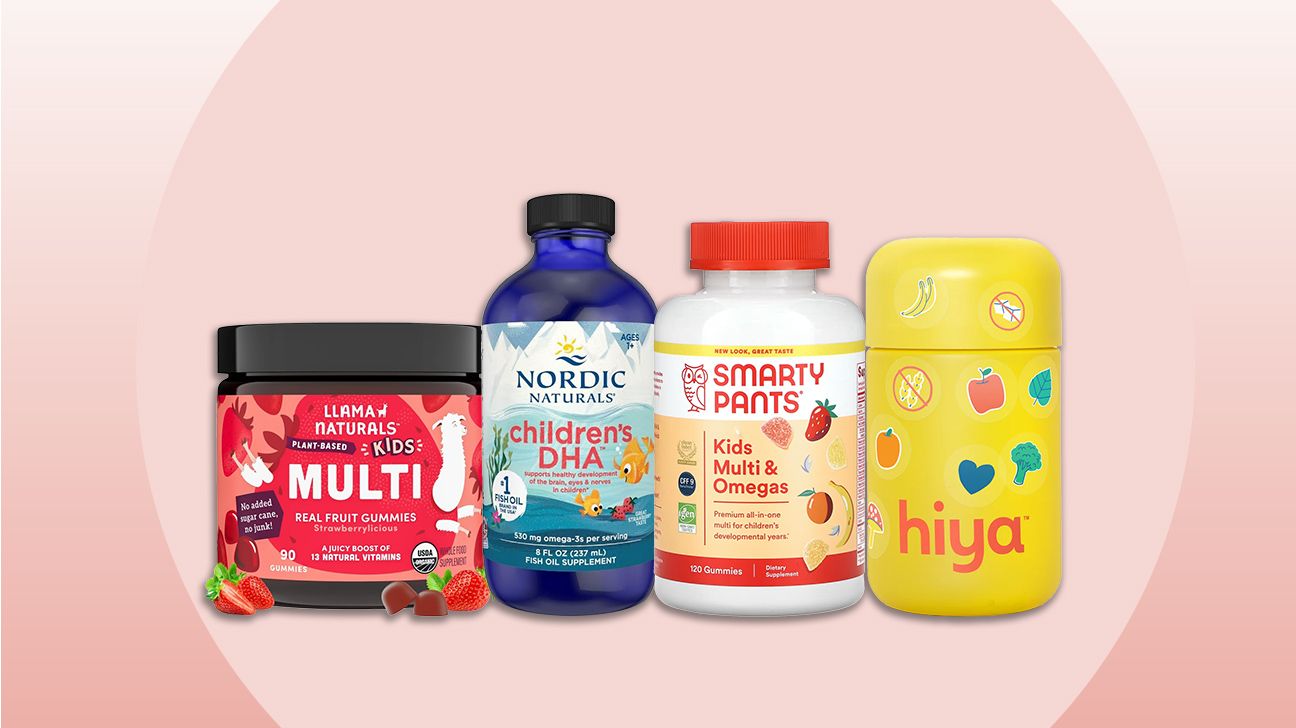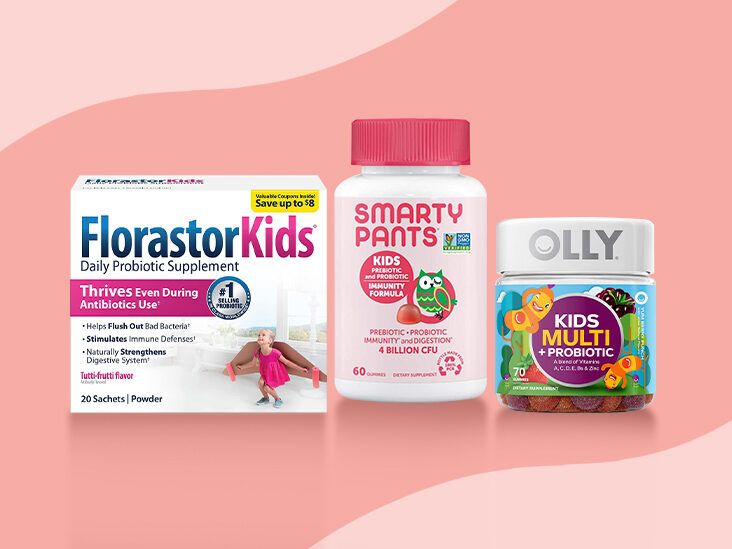From gummies to drops to tablets, our dietitians evaluated the best vitamins for kids. Their top picks come from Llama Naturals, SmartyPants, and Hiya.
Most kids get adequate amounts of nutrients from a balanced diet, but under certain circumstances, children may need to take vitamin or mineral supplements.
Here’s everything you need to know about vitamins for kids, whether your child may need them, and the best products to choose from, as well as a few others that are worth considering.
Keep supplements out of children's reach
Vitamins or supplements can be toxic to children in excess amounts.
Discuss vitamin intake with older children
Talking with a child can help prevent overeating of vitamins and supplements.
A note on price
- $ = under $0.30 per serving
- $$ = $0.30 to $1 per serving
- $$$ = over $1 per serving
Besides the products listed above, there are many other high quality multivitamins for kids on the market.
If you still don’t see a supplement that meets your needs, here are a few additional products to consider:
- OLLY Kids Multi + Probiotic Gummy: Similar to a few others on our list, these gummy vitamins are for kids 2 years and older. In addition to 12 essential nutrients, they contain probiotics, which may be appropriate for some kids.
- Garden of Life Kids Gummy: These certified organic gummies are suitable for kids ages 4 years and up. While we like their comprehensive formulation, they are high in added sugar (4 g per 4-gummy serving), and some reviewers complain of an unpleasant smell.
- Thorne Kids Multi+: These strawberry-kiwi dissolvable discs are for kids ages 4 to 12 years and provide 15 essential vitamins and minerals. While they’re a good alternative to gummy vitamins, some reviewers complain that their kids don’t like the taste. These vitamins are also on the pricier side.
| Vitamin | Price range | Recommended age | Type | Third-party tested | Best for |
|---|---|---|---|---|---|
| Hiya Kids Daily Multivitamin | $$$ | 2+ years | chewable tablet | yes (for purity only) | no sugar added |
| Ritual Essential for Teens Multivitamins for Him | $$$ | 13 to 17 | capsule | yes | teens |
| Llama Naturals Plant-Based Multivitamin Gummies | $$ | 2+ years | gummy | yes | plant-based |
| Renzo’s Kids Multivitamin Tablets | $ to $$ | 2+ years | dissolvable tablets | yes | multivitamin with iron |
| Nordic Naturals Children’s DHA | $ to $$ | 1 to 6 years | liquid | yes | healthy brains |
| Carlson Labs Baby’s Super Daily D3 | $ | 0 to 12 months | liquid | yes | vitamin D drops for infants |
| SmartyPants Kids Multi & Omegas | $ | 4+ years | gummy | yes | allergen-free |
| First Day Kids’ Daily Enrichment Multivitamins | $$$ | 4+ years | gummy | yes | a gummy option |
There are several important factors to consider when choosing a supplement for your child, which is what we considered when choosing these products.
These products were selected based on the following criteria:
- Ingredients: We looked for vitamins that are free of fillers, artificial flavors, food dyes, and preservatives. All products adhere to allowable health claims and labeling requirements, per Food and Drug Administration (FDA) regulations, and come from facilities that adhere to current good manufacturing practices (CGMPs) established by the FDA.
- Credibility: We chose products from medically credible companies that follow ethical, legal, and industry best standards and that provide objective measures of trust, such as testing its supplements at third-party labs.
- Dosage: We included products that companies formulate specifically for infants or kids.
- Supplement form: We included multivitamins in several forms, such as liquid, chewable, dissolvable, and gummy.
- Reputable brands: We selected products from well-known brands that adhere to strict manufacturing standards.
If your child follows a restrictive diet, cannot adequately absorb nutrients, or is a picky eater, they may benefit from taking vitamins.
Here are some tips on what to look for when selecting a supplement:
- Third-party testing: To ensure that the contents match the label, look for a product that has gone through third-party testing, such as NSF International, United States Pharmacopeia (USP), ConsumerLab.com, Informed Choice, or the Banned Substances Control Group.
- Kids-specific formulation: Choose vitamins that are specifically for kids. These products shouldn’t contain megadoses that exceed the daily nutrient needs of children.
- Age-appropriate formulation: Select a product that’s formulated for the specific age of your child. While many multivitamins are for kids 4 years and older, there are a few options for younger toddlers.
- Nutrient needs: Be sure to talk with your child’s pediatrician or a registered dietitian to determine which nutrients your kid’s multivitamin should contain.
- Additives and sugar: When possible, choose a multivitamin that contains minimal amounts of added sugar and artificial additives.
Always discuss supplements with a healthcare professional before giving them to your child.
Kids’ nutrient needs depend on age, sex, size, growth, and activity level.
According to health experts, children ages 2 to 8 years need 1,000 to 1,400 calories each day. Kids ages 9 to 13 years need 1,400 to 2,600 calories daily, depending on factors such as activity level.
In addition to including enough calories, a child’s diet should meet the following
| Nutrient | DRI for ages 1 to 3 | DRI for ages 4 to 8 |
|---|---|---|
| calcium | 700 mg | 1,000 mg |
| iron | 7 mg | 10 mg |
| vitamin A | 300 mcg | 400 mcg |
| vitamin B12 | 0.9 mcg | 1.2 mcg |
| vitamin C | 15 mg | 25 mg |
| vitamin D | 600 IU (15 mcg) | 600 IU (15 mcg) |
While the above nutrients are some of the most commonly discussed, they aren’t the only ones kids need.
Children need some amount of every vitamin and mineral for proper growth and health, but the exact amounts vary by age. Older children and teens need different amounts of nutrients than younger kids to support optimal health.
Do kids have different nutrient needs than adults?
Kids need the same nutrients as adults but usually require smaller amounts.
As children grow, it’s vital for them to get adequate amounts of nutrients that help build strong bones, such as calcium and vitamin D.
Moreover, iron, zinc, iodine, choline, and vitamins A, B6, folate, B12, and D
Although kids may need smaller amounts of vitamins and minerals than adults do, they still need to get enough of these nutrients for proper growth and development.
In general, children who eat a balanced diet don’t need additional vitamin supplements. However, infants have different nutrient needs than children and
The AAP and the
Instead, they suggest that kids eat a variety of fruits, vegetables, grains, dairy products, and protein foods to obtain
However, some may require supplements in specific circumstances, such as those who:
- Follow a vegetarian or vegan diet: Plant-based diets may lead to
deficienciesTrusted Source in calcium, iron, zinc, and vitamins B12 and D, especially if few or no animal products are consumed. A lack of these nutrients in children’s dietscan haveTrusted Source serious effects on their health, such as atypical growth and developmental delays. - Have certain medical conditions: Conditions like
celiac diseaseTrusted Source , inflammatory bowel disease (IBDTrusted Source ), cancer, andcystic fibrosisTrusted Source can affect nutrient absorption or increase nutrient needs. For instance, people with cancermay requireTrusted Source certain supplements to prevent disease-related malnutrition. - Are picky eaters:
Picky eatingTrusted Source decreases the variety of foods in a child’s diet and may lead to low intakes of key nutrients like zinc, as suggested by somestudiesTrusted Source . In such cases, testing for deficiencies can help determine if supplementation is necessary.
Katie Drakeford, a registered dietitian and board certified specialist in pediatric nutrition, emphasizes providing a variety of nutritious foods, including fruits, vegetables, whole grains, lean proteins, and healthy fats.
Some of the most common nutrient deficiencies seen in childhood include iron, calcium, and vitamin D. According to Drakeford, “incorporating iron-rich foods like meat, legumes, spinach, and fortified cereals can help prevent iron deficiency anemia.” She also recommends pairing these foods with vitamin C-rich options, such as strawberries, tomatoes, or citrus fruits, to enhance iron absorption.
Vitamin D and calcium are critical for bone health. While fortified foods like egg yolks, orange juice, and cereals provide vitamin D, Drakeford suggests that spending a few minutes outside can also boost levels of vitamin D. It’s important, though, to use sunscreen to prevent sunburn. For calcium, she advises including foods like milk, yogurt, cheese, and dark leafy greens in your child’s diet.
If you’re concerned about whether your child is getting enough nutrients, consult with a pediatrician or a registered dietitian before considering supplements.
While supplements can be helpful in the right situation, it’s essential to approach them with caution.
There are risks associated with vitamin supplementation. Drakeford warns that “there are potential risks of vitamin toxicity, especially with the
To ensure safety, Drakeford recommends selecting supplements from trusted brands that undergo third-party testing for quality, purity, and safety. “Vitamin and mineral dosing varies by age, so check the label carefully to ensure you are selecting an appropriate product for your child,” she adds.
Ultimately, Drakeford emphasizes that it’s best to rely on food first for getting vitamins and minerals. “Serve a variety of whole foods to ensure your child is being exposed to all of the different vitamins and minerals,” she recommends.
Some children may have increased needs and a supplement may help, but it’s best to consult a children’s healthcare professional before starting anything new.
The type of vitamin supplements your child may need will depend on their age and any specific health concerns they have. Consult a pediatrician to see whether your child needs or would benefit from taking vitamins.
If a pediatrician recommends that your child take vitamins, look for quality brands that have been tested by a third party and are formulated with the appropriate doses of nutrients for kids (to avoid toxicity).
Not all kids need vitamins, but some groups may benefit from them, such as those with limited sunlight exposure, darker skin, and more clothing coverage. In particular, breastfed and partially breastfed infants should be given vitamin D supplements shortly after birth.
Outside of this age group, when you should start giving vitamins to kids depends on when they begin to have needs that warrant supplements. For instance, a child who has undergone surgery that affects nutrient absorption will likely need to start taking vitamins after the surgery.
Discuss with a pediatrician to confirm the best time to give vitamins to your child.
While vitamins and minerals shouldn’t be used to replace other treatments for behavioral problems, some research suggests that certain supplements could reduce symptoms of certain conditions that affect behavior, such as ADHD.
For example, one review reported that omega-3 fatty acids may improve emotional difficulties, attention, and behavior in children and adolescents with ADHD. Similarly, a 2019 study found that vitamin D supplementation could improve behavioral problems and reduce impulsivity in kids with ADHD.
A pediatrician can help determine whether supplementation may be beneficial for your child.
Gummy vitamins can be a good option for kids, especially if they’re third-party tested for quality and safety. However, some experts question the marketing of gummy vitamins, pointing out that encouraging children to consume them like candy may send mixed messages about health.
Additionally, gummy vitamins may not be the best choice if you’re concerned about added sugars, as some gummies contain several grams per serving. Always check the label and consider sugar-free options if necessary.
Kids who eat a nutritious, balanced diet typically fulfill their nutrient needs through food.
Still, vitamin supplements may be necessary for picky eaters, children with a health condition that affects nutrient absorption or increases nutrient needs, and those who follow a vegetarian or vegan diet.
When providing vitamins to children, be sure to choose high quality brands that contain appropriate doses for kids and stick to the recommended dosage.
It’s also best to be cautious of giving your child supplements without documented evidence of a deficiency.
To ensure that your child is getting enough nutrients, try to offer them a balanced diet that includes a variety of foods and limits sweets and refined foods.










